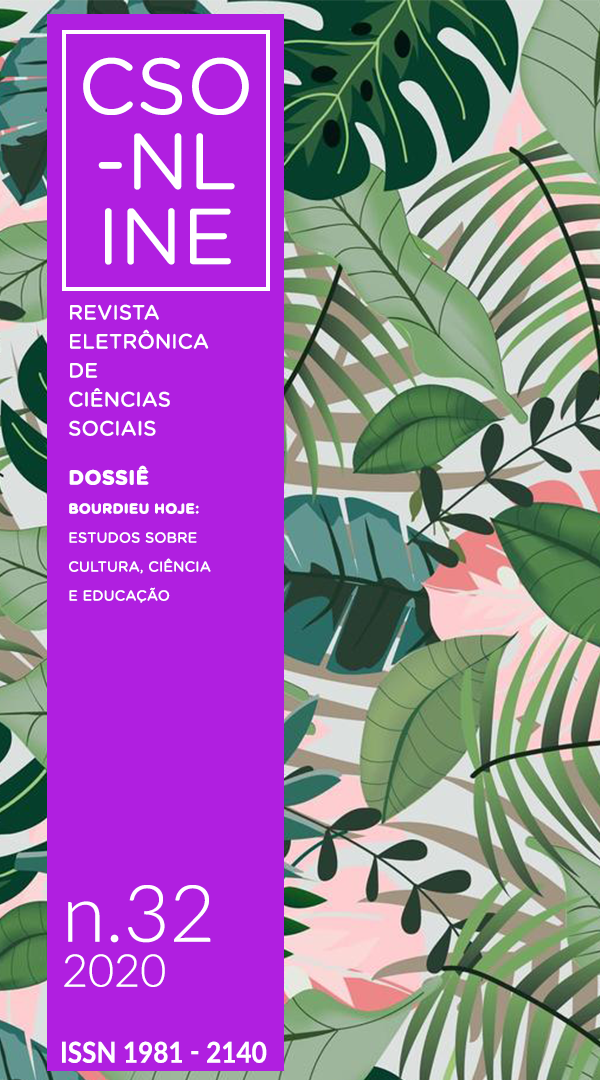When science meets self-analysis
Pierre Bourdieu's heritage for a sociology of self-defense
DOI:
https://doi.org/10.34019/1981-2140.2020.32447Keywords:
Pierre Bourdieu, Self analysis , Science, Social class, HabitusAbstract
This article interprets the scenario of the scientific field in contemporary Brazil in the light of Pierre Bourdieu's sociological theory. In this effort, he looks at how Bourdieu produces a theory of classes, suggesting that his sociology reorganizes the Marxian scheme in the matter of interests. It reconstructs the way in which Bourdieu makes habitus an operative concept, and points out the extent to which habitus is restricted by social class. In the sequence, the analysis regarding the articulation established between the class and the habitus operates, showing how much this connection acts in the composition of the agents' world perception categories. The article chooses Bourdieu's concept of collective self-analysis or collective socio-analysis, placing the Brazilian scientific field under analytical scrutiny. The elaborated interpretation indicates that the political rearticulations of the last years, especially of the middle classes, resulted in a weakening of the Brazilian scientific field. Along with this, the administrative reforms and budget cuts of the State put researchers in a conflict situation due to the scarcity of resources. Finally, the text recalls some outputs produced by Pierre Bourdieu in the French context, when science is under the attack of neoliberalism. This is to encourage, in the horizon of debates between Brazilian researchers and scientists, the possibility of sketching a sociology of self-defense of the autonomy of the scientific field.
Downloads
References
______. Contrafogos: táticas para enfrentar a invasão neoliberal. Rio de Janeiro: Zahar, 1998.
______. Esboço de auto-análise. São Paulo: Companhia das Letras, 2005.
______. Esboço de uma teoria da prática: precedido de três estudos de etnologia Cabila. Oeiras: Celta, 2002.
______. Lições da aula. São Paulo: Ática, 1988.
______. Meditações pascalianas. Rio de Janeiro: Bertrand Brasil, 2001.
______. O poder simbólico. Rio de Janeiro: Bertrand Brasil, 2004a.
______. Os usos sociais da ciência: para uma sociologia clínica do campo científico. São Paulo: Ed. Unesp, 2004b.
______. Questões de sociologia. Rio de Janeiro: Marco Zero, 1983.
______. Razões práticas: sobre a teoria da ação. Campinas: Papirus, 2011.
BOURDIEU, Pierre; CHAMBOREDON, Jean-Claude; PASSERON, Jean-Claude. Ofício de sociólogo: metodologia da pesquisa na sociologia. Petrópolis: Vozes, 2010.
BOURDIEU, Pierre; PASSERON, Jean-Claude. Os herdeiros: os estudantes e a cultura. Trad. Ione Ribeiro Valle e Nilton Valle. Florianópolis: Ed. Ufsc, 2015.
CARVALHO, Letícia. Capes corta 5.613 bolsas a partir deste mês e prevê economia de R$ 544 milhões em 4 anos. G1, São Paulo, 2 de set. de 2019. Disponível em: <https://g1.globo.com/educacao/noticia/2019/09/02/capes-deixa-de-oferecer-5613-bolsas-a-partir-deste-mes-e-preve-economia-de-r-544-milhoes-em-4-anos.ghtml>. Acesso em: 30 de set. de 2020.
CATANI, Afrânio Mendes. Pierre Bourdieu e seu esboço de auto-análise. EccoS Revista Científica, vol. 10, p. 45-65 jul., 2008.
CICOUREL, Aaron V. As manifestações institucionais e cotidianas do habitus. Tempo Soc., São Paulo, v. 19, n. 1, p. 169-188, jun. 2007.
DURKHEIM, Émile. As formas elementares da vida religiosa: o sistema totêmico na Austrália. São Paulo: Martins Fontes, 1996.
______. Da divisão do trabalho social. São Paulo: Martins Fontes, 2010.
ESCOBAR, Herton. CNPQ diz que não terá verba para investir em pesquisa em 2019. Estadão, São Paulo, 9 de ago. de 2018. Disponível em: <https://ciencia.estadao.com.br/noticias/geral,cnpq-diz-que-so-tera-verba-para-bolsas-em-2019,70002438970>. Acesso em: 30 de set. de 2020.
MARX, Karl. O capital: crítica da economia política. 2ª ed. São Paulo: Boitempo, vol. 1, 2017.
THIRY-CHERQUES, Hermano Roberto. Pierre Bourdieu: a teoria na prática. Rev. Adm. Pública, Rio de Janeiro, v. 40 n. 1, p. 27-53, fev., 2006.
WACQUANT, Loïc. Esclarecer o habitus. Educação & Linguagem, São Paulo, v. 10, n. 16, p. 63-71, jul., 2007.
______. Poder simbólico e fabricação de grupos: como Bourdieu reformula a questão das classes. Novos estud. CEBRAP, São Paulo, n.96, p. 87-103, jul., 2013.
WEBER, Max. Economia e sociedade: fundamentos da sociologia compreensiva. Brasília: Ed. Unb, 2004.
Downloads
Published
How to Cite
Issue
Section
License
Copyright (c) 2020 CSOnline - REVISTA ELETRÔNICA DE CIÊNCIAS SOCIAIS

This work is licensed under a Creative Commons Attribution 4.0 International License.
Todos os artigos científicos publicados na CSOnline – Revista Eletrônica de Ciências Sociais estão licenciados sob uma Licença Creative Commons







